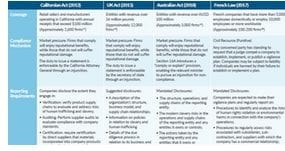
Research Brief: Assessing Legislation on Human Rights in Supply Chains
Combating human rights and labor abuses in global supply chains is one of the critical corporate sustainability challenges of our me. A broad consensus exists that prevailing private regulatory regimes involving voluntary codes of conduct, corporate social responsibility programs, and auditing regimes are often ineffective or insufficient. This has been underscored by recent es mates by the International Labor Organisation (ILO) and the Walk Free Foundation on pointing to the prevalence of modern slavery in the supply chains of widely used products. The last decade has seen greater discussion, and in some cases, enactment, of legislation aimed at addressing these concerns.
The broad intent of these laws is to increase scrutiny of corporate responses to human rights concerns in supply chains and hold firms responsible for any abuses. Examples focused on specific human rights risks include the California Transparency Act
(2012),2 the UK and Australian Modern Slavery Acts (2015, 2018), and the proposed Dutch Child Labor Due Diligence Bill (2017),6 which target modern slavery and child labor specifically. Examples with a broader scope include the French Duty of Vigilance Law (2017), the impending Swiss Due Diligence Law (2018), and the proposed German Due Diligence Law (2019). While these all aim to redress current regulatory failings in global supply chains, they vary in important ways.
This research brief highlights differences in the design of four recently enacted laws. It also looks at how these differences have affected rm compliance and identifies opportunities for further research. The brief will focus on four design features: the number and type of firms subject to the legislation, the compliance mechanism adopted, the reporting requirements, and the definition of supply chains.
Read the full report here.
